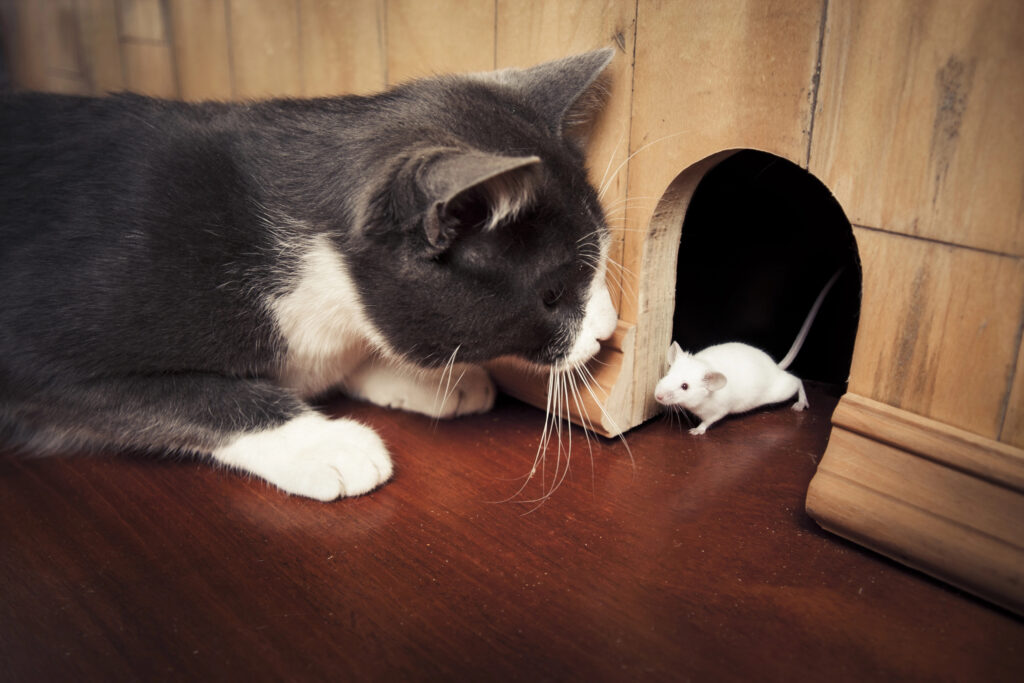Many Houston homeowners try to control rat infestations with household pets like dogs and cats.
While it’s true that cats and certain types of dogs are natural rodent hunters, the reality of attempting to use pets for rat control is a little more complex.
Many domesticated animals won’t hunt.
Cartoon memes about cats blinking lazily as they watch rats run by aren’t entirely hyperbole. Most domesticated cats and dogs receive regular food from their owners, leaving them less inclined to hunt prey.
Much will depend on your pet’s temperament, of course, but you should remember that professional “mousers” from the ancient and medieval eras were not the pampered pets of today. They were sheltered but were not fed, were not given names, and did not generally sleep and play with their owners.
Today’s cats and dogs are part of the family. We wouldn’t dream of failing to feed them just to turn them into “effective mousers.” Many of today’s cats and dogs have been bred to be wholly unsuited to the task to begin with. You’d have to leave either species half-feral to get the job done, and a half-feral cat or dog brings problems of its own.
Only some species of dogs are inclined to chase rats.
Most dogs aren’t rat-control dogs. Terriers, Pinschers, and Daschunds are good rat catchers, and many such breeds are more inclined to try than cats are, whether they’re well-fed or not. These breeds like to hunt and chase, if only for fun.
Assuming you have the right dog, you can get some marginal rat control out of them. However, you’re really only likely to send rats into hiding. They’ll avoid the areas where the dog is and then go right on destroying your attic and your electrical systems.
The smell of cat urine is only marginally effective.
Rats will indeed avoid areas where your cat is leaving urine and other territorial droppings. Unfortunately, this again means that you’ll only keep rats out of your living areas.
They’re dangerous in your walls, ducts, and attic spaces, too. Your cats aren’t going up there. You certainly wouldn’t want to spread around the thick ammonia scent of cat pee in those areas just to keep rats at bay; your home would become unlivable.
Rat populations are too big for other animals to control.
Female rats can mate 500 times in a six-hour period and produce up to 2,000 offspring in a year. Your dog or cat is never going to eat as many rats as a Momma rat can produce.
Thus, your pet might make you feel better when they proudly drop one dead animal at your feet (which you will then have to handle and which your pet will have handled), but thousands more will be hiding out where you can’t see them.
Rats may attack and harm your pets.
If you love your pets, the last thing you want is to put them in direct confrontation with rats. Rats will bite and scratch when cornered, which can mean injury to your animals. It may also mean allowing your pet to become infected with one of the many diseases that rats carry. Several of those diseases are fatal to pets as well as to humans.
Pets are usually part of the family in the modern era, and most of us work hard to ensure that no harm befalls them. Placing your pet in the role of rat-catcher or mouser changes that relationship, often with tragic results.
Spare your furry friends. Get professional help.
Don’t wait for a rat problem to get worse. Professional rat control is more affordable than you probably think it is, works faster, and does a better job of ensuring every last rat gets removed from your home. We also offer ongoing control methods to ensure that rats stay gone.
Think you have a rat problem? Contact us to schedule an inspection today.



